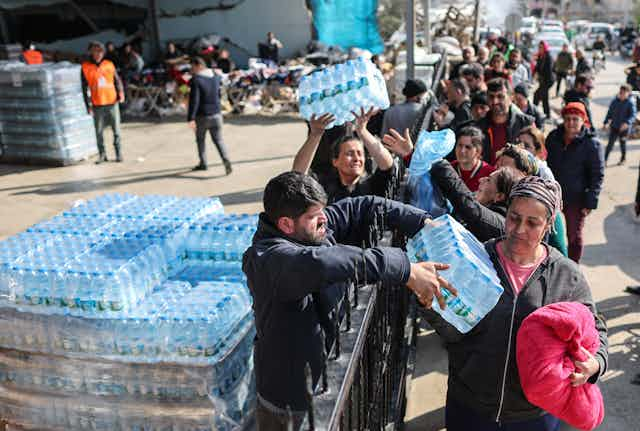Two major earthquakes shook southern Turkey on February 6 2023. Over 50,000 people lost their lives and nearly 2 million people – many of whom were Syrian refugees – were evacuated from the country’s affected provinces.
Disasters are not simply natural phenomena. They are also influenced by what was not done before, during or after the event. The Turkish government’s response to the crisis has been reactionary rather than pre-planned, exacerbating the death toll and the suffering that has followed.
Because the government was not ready, basic needs in some areas were not met even days and weeks later. Victims reported finding it challenging or impossible to fulfil basic hygiene, water, heating, clothing, sleep and privacy needs.
A report released by the World Health Organization in March 2023, a month after the initial quakes, also indicated that people with underlying medical conditions might face limited access to medical care due to overburdened and damaged health infrastructure.
Over the past year, I have carried out research with colleagues based in Turkey (Arzu İcagasioglu Coban and Gonca Polat). Our study, which has not yet been published, involved exploring social workers’ experiences in disaster management in the earthquake-affected regions of Turkey.

The social workers we have spoken to repeatedly underline that a lack of coordination among institutions has acted to reduce the effectiveness and efficiency of the support services they provide. Following the quakes, these workers distributed aid, carried out need assessments, and offered psycho-social support to survivors.
In the badly damaged Turkish province of Malatya, we interviewed one social worker who said: “There was so much aid coming, but it could not be distributed. We couldn’t organise. In the first week, it was very difficult to even find water and food for the rescue teams.”
Rooted in politics
The deficiencies in disaster management that have been seen in Turkey are deeply rooted in underlying political issues. Turkey’s democratic institutions have been deliberately weakened by the country’s leader, Recep Tayyip Erdoğan, who has consolidated his rule over the past two decades.
In 2009, three government units were merged to form a new independent department that would prioritise risk management. This new department was called the Disaster and Emergency Management Authority (Afad).

However, using newly acquired presidential decree powers following the 2017 constitutional referendum, Erdoğan transferred control of the Afad to the Ministry of the Interior. This move effectively eliminated the Afad’s ability to operate autonomously.
The decline of Turkey’s public institutions undoubtedly contributed to the slow and uncoordinated response to the earthquakes. There was very little rescue activity at all in the 24 hours that followed the initial quakes, and only marginally more the day after.
Residents in the affected areas also expressed frustration that they could not get in contact with the Afad to arrange help for themselves and others who were trapped under rubble.
Uncoordinated response
Many of the social workers we have spoken to argue that this uncoordinated response led to earthquake victims having only limited access to essential services such as medical help, food and accommodation in the immediate aftermath of the initial earthquakes.
Some participants shared the opinion that most of the newly employed social workers and other professionals lacked sufficient training and experience to provide psychological support in such crisis environments. One social worker, who worked in the damaged city of Gaziantep, said that many of those hired to give psycho-social support were “inexperienced, newly graduated personnel”.

Interviewees have also told us that some of the country’s most vulnerable groups, including ethnic and religious minorities, were not afforded fair and equal access to humanitarian aid. Several reports indicate that Syrian refugees were forcibly removed from emergency shelters and have been subjected to verbal abuse.
Discrimination and animosity towards Syrian refugees appear to have intensified in the earthquake-affected areas of Turkey since the start of the crisis.
There is still considerable need for a more coordinated approach to disaster risk management in Turkey. If nothing changes, the quality of the social services provided will continue to suffer.

